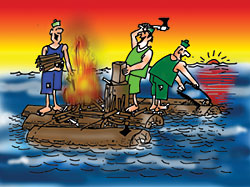 Two world leaders most conspicuous by their absence at the Earth Summit in Johannesburg this week-as far as we were concerned-were the president of the world's richest country and the prime minister of one of its poorest.
Two world leaders most conspicuous by their absence at the Earth Summit in Johannesburg this week-as far as we were concerned-were the president of the world's richest country and the prime minister of one of its poorest. The fact that Sher Bahadur Deuba didn't attend just went to show that he knows which side his toast is butered: getting a Belgian gun deal unstuck. George W, for his part, was too busy trying to carry on where daddy left off to bomb Iraq into smithereens on or before 11 September. Bush and Deuba were symbolic absentees: they sent the message that threats to the earth's ecosphere come from both prosperity and poverty.

Ten years ago, the senior Bush told the first Earth Summit in Rio de Janeiro that America\'s lifestyle was "not up for negotiation". His son went a step further and killed the Kyoto Protocol last year, destroying even the consensus on reducing carbon emissions that was reached in Rio. This is proof, if proof is still needed in an age of corporate corruption, that oil lubricates American politics.
So, four percent of the world's population keeps burning up 25 percent of its fossil fuel. The Bush administration sees nothing wrong with its citizens emitting six tons of carbon dioxide per head into the atmosphere every year, when an average European with a similar lifestyle emits one third that, and an average Japanese, a quarter. (It takes nearly 300 Nepalis to burn off as much carbon dioxide as an average American.)
The resulting climate change and sea-level rise may soon wipe the Maldives off the map. There is no such thing as "my back yard" anymore, and global warming is already making a measurable impact on our mountains. Last spring, the inhabitants of Pokhara for the first time in living memory caught the apocalyptic sight of Machhapuchare as a stark black pyramid devoid of any snow. The Khumbu Glacier has retreated 5 km since the first ascent of Mt Everest 50 years ago. Glacial lakes in Nepal and Bhutan are brimming with melted snow, several are in danger of bursting through their moraine barriers. Malaria is climbing up the valleys, and epidemics have been reported even in Kavre district. This year's erratic monsoon is probably nature's way of telling us that we are tampering with the equilibrium.
Johannesburg was supposed to be a historic opportunity to address the development roots of environmental problems: to see that the ecology and the economy are two sides of the same coin. Indeed, as we have seen in Europe, Japan and some American states, eco-friendly policies actually help the economy.
But we also see governments of the South using the argument of Northern over-consumption to carry on with business as usual. Per capita carbon emission levels in countries like China and India may be small, but China is already the third largest source of atmospheric carbon, with 12 percent of the total. In the next 15 years, China and India will account for 40 percent of new carbon in the atmosphere.
China and India also provide a vivid example of the dangers of biodiversity loss. Increased affluence in China is pushing the illicit trade in tiger parts, leading to the decimation of India's tiger population. The tiger is a metaphor for the rest of the ecosystem. The battle to save the planet through sustainable development will be won or lost in Asia: if Asia follows the western model of economic growth the planet is doomed.
So let's stop this kneejerk west-bashing and start putting our own houses in order.


